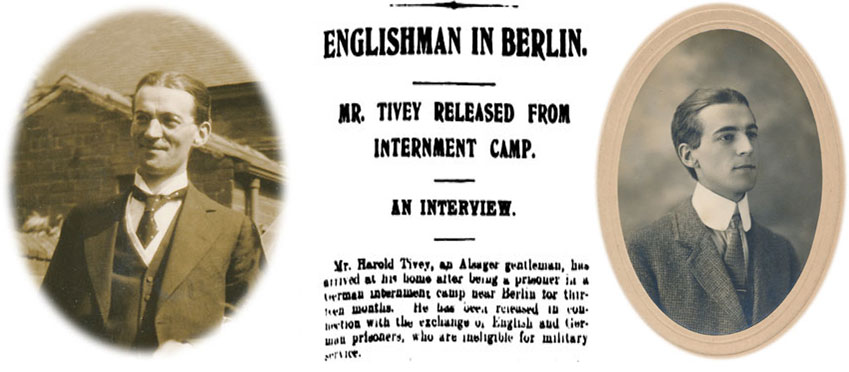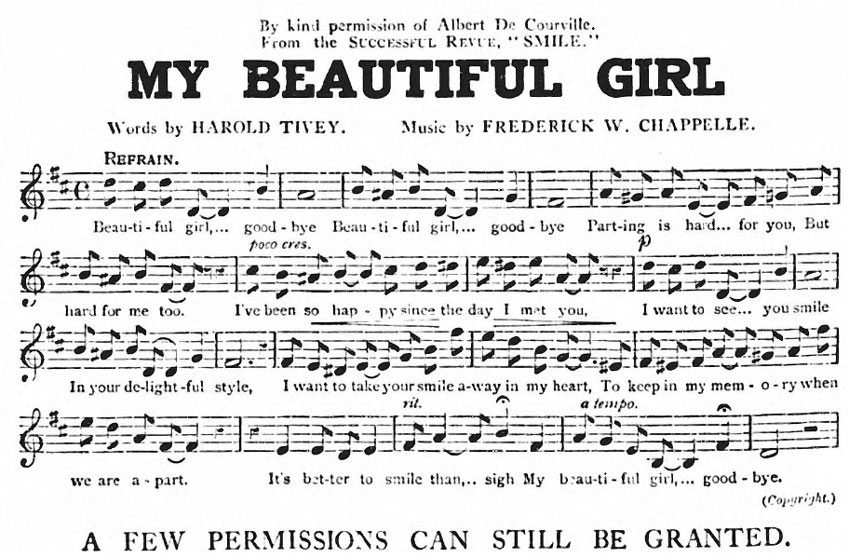German-Prisoner-of-War-Harold-Tivey
Article form the Nantwich Guardian 17th December 1915, Page 5: Harold is from Group 20. This Article is in poor condition and hard to read in parts so I have typed the rest of the Article.

ABOVE: The news article, photos of Harold taken in 1914 and
1919 and the lyrics from "My Beautiful Girl" from the revue
"Smile" a revue written to entertain the prisoners at Ruhleben,
where Harold was held for 13 months until December 1915.
Mr Harold Tivey, an Alsager gentleman
has arrived at his home after being a prisoner in a German
interment camp near Berlin for thirteen months. He has
been released in connection with the exchange of English and
German prisoners, who are ineligible for military service.
Interviewed by a representative of the Guardian, Mr Tivey said
he was following his professional pursuits in Berlin when
diplomatic relationships between Britain and Germany were broken
off. The declaration of war with England evoked scenes of great
exitement. "We were assured" he said " that we should not be
taken, but on the morning of the 6th November 1914, at seven
o'clock I was pulled out of bed by the police and taken to the
city prison, where I spent an hour or two in the cell before
being sent by the military authorities to Ruhleben. On that day
every Englishman in Berlin was taken, regardless of their state
of health or his age, some being dragged out of bed at five
o'clock in the morning. A number of the Englishmen had been in
prison in Berlin as early as August 19th 1914, so the German
Statement that no Englishmen were interned before the inetrnment
of Germans in England, is absolutely untrue. A Large number of
sailors on trading vessels were held up right at the
commencement of the war, and in some cases before the war was
actually decelared. There were some boats about to sail in
Hamburg on the Friday before the day of the declaration, and one
was held up, the officers and men being made prisoners. The
people shouted at us as we were being taken to prison, but we
were subjected to no hostile demonstartion to speak of.
IMPROVED TREATMENT
"The treatment at first was very bad,
but it is much better now. The food was very bad, when I left,
but ut was worse at the beginning. The cooking of the food is
now managed by the British prisoners, but the supply is quite
inadequate. Everybody has friends or relatives, or knows of
anyone interned in Ruhleben or any camp in Germany should send
regular supplies of butter or margarine, dripping, lard and
milk. The supply of fat in the food is negligiblw.
"Parcels to Ruhleben" he added " have arrived safely, with on or
two exceptions. Parcels to military camps rarely arrived at the
beginning, but it seems that now things in many of the camps
have improved. Ruhleben is one of the best camps in Germany.
Some of the military camps are terrible places, and every effort
should be made to help those who are out there. All the
improvements made at Ruhleben have been made with the help of
British money. the German military authorities never having
provided a knife, fork, or soap, or any of small similar
necessaries of life. It is impossible to get butter or milk in
any of the camps because the Germans have difficulty in getting
them themselves.
SCHOOL AND THEATRE
"So far as improvements go, the
prisoners have themselves organized a school, which is very
successful, the teaching being done voluntarily, and comprising
all the subjects that one might have taught at university. they
also have a very capable and efficient theatre,a s there are
many professional artists there. The spirit of the men at
Ruhleben is very good, but at some of the camps they were badly
treated. A batch of civilian prisoners who had been at the
mllilitary camp at Wittenberg, numbering about twenty stated
that Ruhleben was heaven compared with the camp they had left.
"there is apparently great disparity in the treatment meted out
in the various camps. this tends to depend on the character of
the commanding officer, As an instance, a wounded private from
the Northumberland Fusiliers told me his treatment had been
quite good."
FOOD
RIOTS
Asked to give his opinion upon the
recent newspaper reports of Berlin food riots, he said "There
certainly have been bitter riots in Berlin. there was one on the
Sunday just before my release, and there has been talk of a big
peace demonstratio. Ruhleben is near Berlin, and news very often
finds it's way to the men imprisoned there. It is quite possible
there have been these riots in Berlin, but such news never gets
into German newspapers which we were allowed to see. The papers
made a statement that such news never would be published. The
people in Germany" he further stated "were led to believe that
all Germans in England were interned in October 1914 and a Pro
campaign was started by certain Berlin newspapers for the
imprisonment of Englishmen in Germany. After sinking of the
Lusitania when it stated that a large number of Germans
in England were interned one or two of the newspapers expressed
surprise at hearing that there were still a large number of
Germans free in England. This surprise was shared by a number of
the population. the Germans were very bitter when they heard of
the anti-German riots in England. Pictures were reproduced and
they sneered at English civilisation.
BELIEVE THEY ARE WINNING
"The temper of the German people" he
concluded" is much more chastened that at the beginning of the
war, but they still believe they are winning. I believe a large
number are more interested in the fact that the price of food is
than they are conquering their enemies. The German authorities
are very careful in their scrutiny of those who cross the
border" Mr Tivey was well received by the authorities after
crossing into Dutch territory, and he had a very
good journey from Flushing to Tilbury and very gald again to
breathe the free air of old England.

